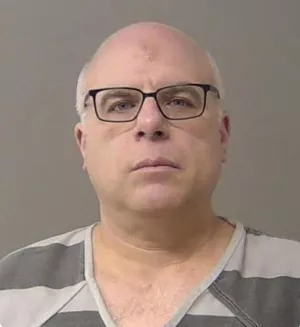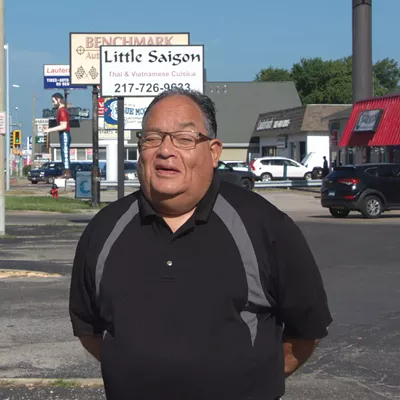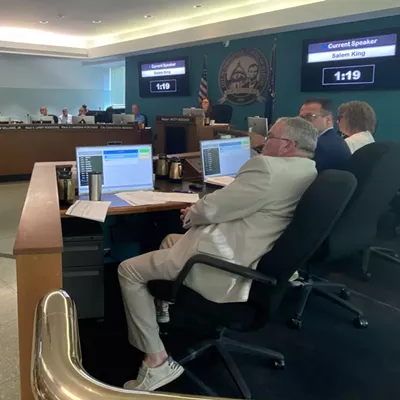Sam McCann illegally spent
political contributions funded by the union dues of those who saw him as a
friend of working people on luxury vehicles, a recreational motor home, trips,
personal debts, home mortgage payments and to boost his income.
Those were the allegations contained in evidence and statements
presented on Feb. 13 during the first day of McCann’s bench trial in
Springfield’s U.S. District Court.
Assistant U.S. Attorney Timothy Bass said the illegal campaign
spending and tax evasion case against McCann, the unsuccessful Conservative
Party candidate for governor in 2018, was about “greed, fraud and arrogance.”
Bass told Judge Colleen Lawless, who is presiding and will decide McCann’s guilt or innocence, that the former Republican state senator from Macoupin County, who served from 2011 to 2019, used hundreds of thousands of dollars in contributions to his campaign funds to live “far beyond his means.”

“There was really no limit to his schemes to steal money,” Bass
said in his opening statement at the trial, which was expected to last several
days.
McCann, 54, has pleaded not guilty but so far not responded to the
criminal allegations for which he was indicted by a grand jury in 2021. He could
face a prison term of 20 years or more, if convicted.
McCann sat emotionless and took notes next to his court-appointed
attorney, Jason Vincent, who opted to wait until the prosecution finished
presenting its case before offering a defense.
McCann
was interviewed by FBI agents at least four times in 2018 and “had almost no
explanation for almost all” of the activities later charged as crimes in the
indictment, Bass said.
At one point, McCann told
FBI officials, “‘I would throw myself on the mercy of the court,’” according to
Bass.
Even
after the gubernatorial election, during which McCann received far fewer votes
than incumbent GOP Gov. Bruce Rauner or the eventual winner, Democrat JB
Pritzker, McCann illegally spent more than $300,000 remaining in his political
coffers in 2019, Bass said.
Marc Poulos, executive director of the labor management group of
the International Union of Operating Engineers, Local 150, testified that the
union endorsed McCann for governor and contributed more than $3 million to
McCann as a candidate, mostly during his unsuccessful bid for governor.
The union supported McCann because he was viewed as a “labor-friendly”
and “lunch-pail” Republican who “stood up for working-class people,” Poulos
said.
Poulos testified that the union “would not have been pleased” to
know McCann allegedly used some of its campaign contributions to support a
lavish personal lifestyle.
McCann began his trial seated in a wheelchair and wearing a gray
striped jumpsuit from the Macon County Jail. He had been free since his
indictment, but Lawless revoked his pretrial release on Feb. 9 after he
repeatedly failed to inform court officials of his whereabouts at various
points before, during and after a recent hospital stay in Missouri.
McCann’s wife, Vicki, a registered nurse, drove her husband about
an hour from his home to Missouri Baptist Medical Center in St. Louis on Feb. 4
after he reportedly fell at home, had chest pain and “almost passed out,”
according to medical records later discussed in court.
Doctors at the hospital never diagnosed McCann with any heart
problems or other critical health issues during the stay. They discharged him
Feb. 8 and said he was alert and oriented, according to evidence presented in
court.
Lawless said McCann failed to inform the court that he was headed
to the hospital and failed to comply with a court order to notify officials
when he arrived back home after discharge.
When McCann showed up for court on Feb. 9, Lawless granted a
request from Bass that McCann be taken into police custody for the duration of
the trial. Bass said McCann’s hospital stay was “self-created” to delay and
manipulate the legal process.
Lawless told McCann on Feb. 9, “There seems to be an excuse every
time, and there are no more excuses, sir.”
Bass said McCann was “cleared medically” for the trial, which had
been scheduled to begin Feb. 12. But McCann told the judge that day that he
wasn’t receiving all of his prescribed medicines while in jail, was feeling
chest pain and felt “like I could pass out at any moment.”
He said he didn’t feel “medically or psychologically ready” for
the trial to begin. He also told the judge Feb. 12 that he had no recollection
of getting dressed, driving to Springfield and appearing in court Feb. 9 even
though he engaged in detailed interactions with Lawless about his attempts to
update court officials after the hospital discharge.
The four-day hospital stay “left me in a very foggy state,” McCann
said Feb. 12.
McCann had fired his
court-appointed attorneys in November, saying he wanted to represent himself.
Then on Feb. 12, after conferring with Vincent, who at that time was his
court-appointed “stand-by” attorney, McCann decided to allow Vincent to fully
represent him at trial.
The judge granted Vincent’s request for an additional day to
prepare for trial.
Dean
Olsen is a senior staff writer at Illinois
Times. He can be reached at 217-679-7810,
dolsen@illinoistimes.com or twitter.com/DeanOlsenIT.













